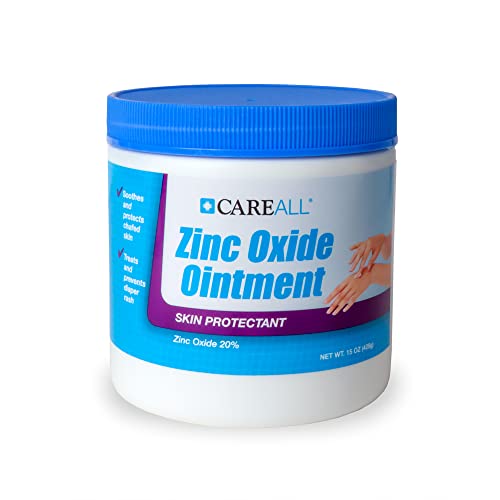Zinc oxide is a mineral that is naturally found in the Earth’s crust. This mineral has been used for centuries as a topical treatment for various skin conditions and is found in many skin-care products.
Some people believe that zinc oxide can help treat seborrheic dermatitis. However, unlike zinc pyrithione and zinc sulphate, there is no research to support this claim. There are also some concerns about its safety as some people have reported adverse effects including skin allergies and contact dermatitis.
Let’s take a deep dive:
What is zinc oxide?
Zinc oxide is a white, crystalline material that is found in ore deposits and can be produced from zinc by reacting it with oxides of other elements. This white powder is used as an ingredient in many different products, including cosmetics and sunscreens. It’s also used to treat skin conditions such as eczema and diaper rash.
Effective use of topical zinc oxide therapy
In recent years, zinc oxide has become a popular ingredient in dermatology, particularly in products marketed for use on the skin. There is some evidence to suggest that zinc oxide can help to treat certain skin conditions, such as eczema, nappy rash and pressure sores. The efficacy of zinc in treating these ailments are widely known.
Zinc oxide cream is also often used in treatment creams for poison ivy and in physical sunscreens to protect the skin from sunburn. Zinc oxide’s benefits include a reduction in itching, infection and burning sensation. Some people even use zinc oxide creams to treat seborrheic dermatitis, shingles, chickenpox, rosacea and warts.
I find zinc oxide most useful as a mineral sunscreen. Seb derm causes an impaired skin barrier, making chemical sunscreens potentially dangerous as it absorbs into the blood stream a lot easier. Due to its poor absorption, zinc oxide sits on the surface of the skin and is much safer. These are the The 5 Best Sunscreens for Seborrheic Dermatitis.
Is zinc oxide antifungal?
Zinc oxide has been shown to be effective against certain fungi like Penicillum and Botrytis. In fact, zinc oxide nanoparticles have even stronger antifungal activity against fungi like Aspergillus and Candida albicans.
Unfortunately, there is no clinical evidence that topical zinc oxide has any activity against Malassezia yeast, the main perpetrator in seborrheic dermatitis.
Will zinc oxide help seborrheic dermatitis and dandruff?
Seborrheic dermatitis is an inflammatory condition caused by a yeast overgrowth in the sebaceous (oil) glands of your face and scalp. While there is no cure for seborrheic dermatitis, the rash can often be treated with topical medications and self-care measures. There are many topical creams that help control the dry flaky skin associated with seborrheic dermatitis.
Topical zinc therapy is often used as an at-home treatment option for seborrheic dermatitis sufferers who want to avoid prescription medications. While zinc oxide may help with inflammation, it is not known if this helps with the overall condition. Despite anecdotal stories of how effective zinc oxide is for seborrheic dermatitis and dandruff, there is no evidence that it actually works.
In fact, zinc oxide may aggravate seborrheic dermatitis. If you’ve ever used nappy cream, you’ll know it’s a thick paste. Absorption of zinc is dismal. The cream basically sits on your skin as a physical barrier for a long time. It also leaves behind a thick film and doesn’t allow the skin to breathe. Zinc oxide may clog your pores and aggravate acne and SD further.
Having said that, some skin care products for seborrheic dermatitis do contain small amounts of zinc oxide for its skin repair properties. In small amounts, these products containing zinc may be helpful for SD.
Side effects of zinc oxide
When using a zinc oxide paste, it is important to be aware of the possible side effects. Though rare, some people may experience an allergic reaction or irritant contact dermatitis after using the ointment. If this occurs, discontinue use and consult a doctor.
When you are using zinc oxide cream for the first time, it is important to do a patch test. This will help you determine if you are allergic to the product. To do a patch test, find an area of unaffected skin and apply a small amount of the product. If there is no reaction after 24 hours, then you can proceed with using the cream on other areas of your body.
Other than that, treatment with zinc oxide is generally safe for most people. However, it is always important to read the label and follow instructions on the product. Avoid getting the ointment in your eyes as it can cause irritation.
Zinc oxide vs zinc pyrithione
Zinc oxide is mineral compound that is commonly found in skincare products to repair the skin’s physical barrier and protect it from further damage.
Zinc pyrithione is a coordination complex of zinc. As with zinc oxide, it has antifungal and antibacterial activity. Unlike zinc oxide, topical zinc pyrithione is clinically proven to treat dandruff and seborrheic dermatitis. This is why it’s used in many anti-dandruff shampoos like Head & Shoulders shampoo and other seborrheic dermatitis treatments.
Zinc PCA, which is a combination of Zinc and L-PCA, also has beneficial effects for the scalp. It’s an active ingredient in Dermarest Medicated Shampoo.
To wrap up
Zinc oxide appears to be a safe and effective treatment for various skin ailments but not for seborrheic dermatitis. There are plenty of other moisturizers, antifungal creams and essential oils that are more effective in the treatment of seborrheic dermatitis.
 Check it out on Amazon
Check it out on Amazon Check it out on Amazon
Check it out on Amazon Check it out on Amazon
Check it out on Amazon
Pingback: Is Head and Shoulders good for seborrheic dermatitis?
Pingback: The 6 Best Face Moisturizers For Seborrheic Dermatitis
Pingback: Is Avene good for seborrheic dermatitis?
Pingback: best sunscreen seborrheic dermatitis